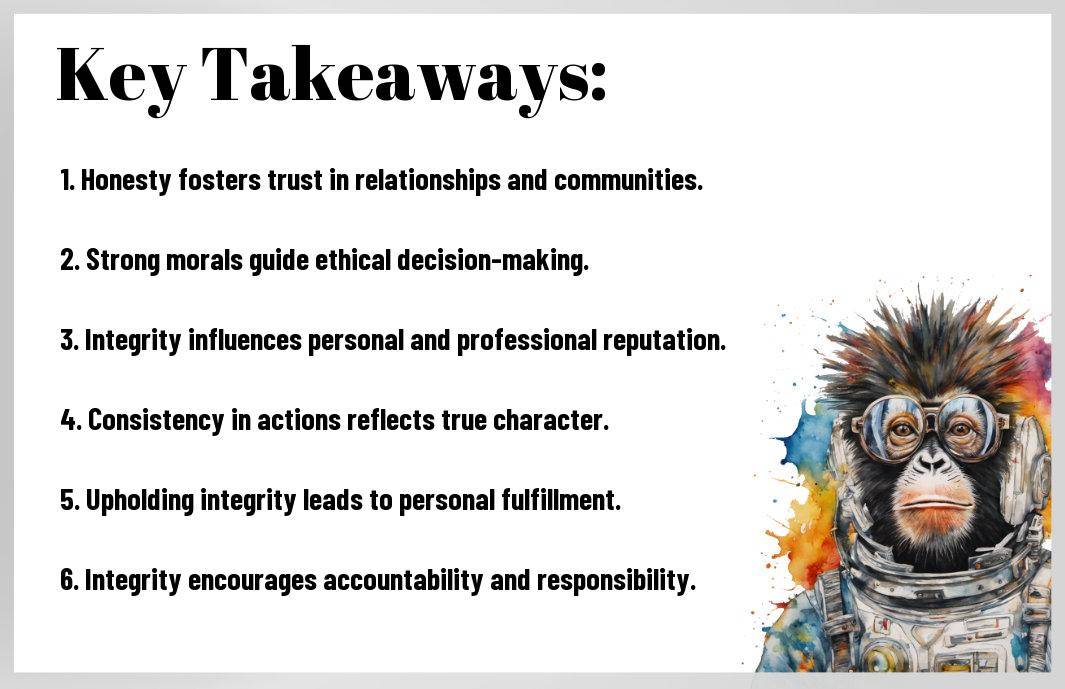
Newsletter Subscribe
Enter your email address below and subscribe to our newsletter

Enter your email address below and subscribe to our newsletter

There’s an undeniable power in integrity, as it shapes the foundation of our personal and professional lives. I believe that being honest and adhering to strong moral principles not only builds trust but also enhances your reputation. When you act with integrity, you make decisions that reflect your values, which can lead to positive relationships and opportunities. However, the absence of integrity can result in damaging consequences, not only for yourself but also for those around you. In this blog post, I will examine into the importance and impact of integrity in our daily lives.


While integrity is often seen as a personal virtue, it extends beyond individual behavior. It encompasses a consistent commitment to honesty, ethical standards, and accountability in all aspects of life. When you strive to uphold integrity, you not only foster trust and respect in your relationships but also create a positive environment for growth and collaboration. Integrity is the foundation upon which strong character is built, and it significantly influences how you navigate challenges and decisions.
After considering various perspectives, I define integrity as the adherence to moral and ethical principles, coupled with honesty and consistency in actions. It’s about being true to one’s values, even when faced with difficult choices or external pressures. Integrity shapes your identity and guides your decisions, ensuring that you act in alignment with your beliefs.
Integrity plays a vital role in fostering honesty, which is important for building trust in relationships. When you are honest, you demonstrate that your words and actions are aligned, creating an environment of respect and reliability. Honesty not only strengthens personal connections but also encourages open communication; it promotes transparency and accountability.
Integrity drives the importance of honesty in my life. When I am honest, I build trust with those around me, paving the way for stronger relationships. Honesty reflects my character and values, allowing others to see I am reliable. It can create a ripple effect, inspiring others to act with transparency and integrity as well. By being honest, I can foster an atmosphere where open communication thrives, ultimately leading to constructive collaboration and positive interactions.

There’s a foundation of core moral principles that guide our decisions and interactions. These principles are fundamental in building character and fostering a sense of trust and integrity. They include values such as respect for others, accountability, and responsibility, which collectively enable us to uphold honesty and strong moral standards in our daily lives.
Beside integrity, showing respect for others is paramount. It involves recognizing the inherent worth of every individual and valuing their perspectives, regardless of differing opinions. I believe that fostering an environment of respect encourages open communication and collaboration, allowing us to connect on a deeper level and strengthen our relationships.
By embracing accountability and responsibility, I hold myself to a high standard in both personal and professional realms. This means acknowledging my actions and their consequences, learning from my mistakes, and striving to improve continuously. It empowers you to take ownership of your decisions, fostering a culture of mutual trust and respect.
Respect for others and accountability work hand in hand. When I take responsibility for my actions, I set an example for those around me and inspire a positive response in others. Your consistent demonstration of integrity can lead to a stronger, more interconnected community. Accountability ensures that you not only address your shortcomings but also embrace the opportunity to grow and develop as an individual. Ultimately, by fostering a culture of responsibility, we create an environment where everyone feels empowered to make ethical choices and contribute positively to society.
After embracing integrity, I noticed profound changes in my life and the lives of those around me. Integrity fosters trust and builds strong relationships, both personally and professionally. It encourages open communication, ensuring that my words and actions align, creating a foundation of confidence that empowers individuals to work collectively towards common goals. Integrity not only enhances reputation but also drives others to adopt similar values, forming a ripple effect that transforms environments.
On engaging with others, I found that demonstrating integrity creates an environment where honesty thrives. When I am sincere and uphold my principles, my relationships deepen, fostering mutual respect and understanding. This commitment to integrity allows me to navigate conflicts with a sense of transparency, making it easier to resolve issues and strengthen my connections with loved ones.
About my experiences in professional settings, I’ve learned that integrity serves as a cornerstone for successful collaboration. It enhances my credibility while promoting a positive workplace culture. When I uphold strong moral principles, I inspire my colleagues to do the same, creating an environment where ethical behavior, accountability, and teamwork flourish.
Relationships within a professional context greatly benefit from a shared commitment to integrity. When I engage openly with my peers and uphold honesty in every interaction, I establish trust that boosts overall morale. This not only helps in cultivating a supportive atmosphere but also aids in navigating challenging situations. The consequences of lacking integrity can be damaging; a single unethical choice can erode trust and lead to a toxic environment. Conversely, when I prioritize integrity, the positive outcomes amplify, paving the way for long-term success and fostering a culture rooted in respect and collaboration.
Your journey to uphold integrity is often met with obstacles that test your resolve. Situations may arise that challenge your moral compass, forcing you to confront difficult choices. The battle between staying true to your principles and succumbing to external forces can be daunting. Recognizing these challenges is the first step towards navigating them effectively, ensuring that your conviction remains unshaken in both personal and professional realms.
Behind every ethical dilemma lies a situation where right and wrong are not clearly defined, forcing you to weigh competing values. These conflicts often invoke intense emotions as you contemplate the implications of your decisions on yourself and others. I have found that identifying the core issue and considering the impact on my integrity aids in making thoughtful choices during these challenging times.
By navigating social pressures and expectations, you may find it difficult to remain steadfast in your principles when societal norms push you in conflicting directions. The desire for acceptance can easily sway your actions, complicating your decision-making process and leading you to compromise.
Further complicating this landscape, many people experience a strong desire to fit in, which can lead to choosing between their beliefs and the norms of the group. Sometimes, these expectations are rooted in perceived success or approval from peers. It’s imperative to reflect on what truly matters to you. By embracing your authentic self and surrounding yourself with individuals who respect your values, you foster a supportive environment that enhances your resolve to maintain integrity. Staying aware of the risks associated with succumbing to social pressures allows you to approach these situations with clarity and confidence.
Now, as we strive to enhance our integrity, we can adopt various strategies that will empower us to remain honest and adhere to our strong moral principles. Understanding the INTEGRITY Definition & Meaning is a vital first step, but applying those principles in daily life is where true integrity shines.
To cultivate integrity, I must engage in regular self-reflection. By analyzing my values and actions, I can identify any inconsistencies and reinforce my commitment to living authentically. This awareness allows me to align my decisions with my moral compass.
Around me, it is vital to create a supportive environment that encourages ethical behavior. Surrounding myself with like-minded individuals who value integrity can inspire me and enhance my commitment to it.
Considering the impact of my surroundings, I find that a positive environment significantly influences my actions. Engaging with people who demonstrate high ethical standards motivates me to uphold my principles. Additionally, by openly discussing values with my peers, I foster an atmosphere where honesty and accountability are celebrated. This not only strengthens my resolve but also helps create a collective commitment to integrity within my community.
Not all heroes wear capes, yet many exhibit integrity in their everyday actions. For instance, companies like Integrity Staffing Solutions – People First Workforce Solutions prioritize ethical standards, showcasing how integrity can lead to a trustworthy workplace. Stories of individuals standing up for what is right often inspire us to examine our own values and choices.
Integrity shapes the legacies of many historical figures. From Mahatma Gandhi’s nonviolent resistance to Martin Luther King Jr.’s fight for civil rights, these leaders exemplified a commitment to truth and justice that transcends time. Their choices impacted lives and sparked movements, proving the powerful influence of unwavering moral principles.
Contemporary leaders also embody integrity, demonstrating how values can drive actions. Figures like Malala Yousafzai advocate for education and women’s rights despite facing obstacles, reflecting a strong moral compass. These role models inspire you to hold onto your values, regardless of difficulties.
Consequently, you can look to these role models for guidance in your own life. Their ability to act with integrity in challenging situations encourages you to be steadfast in your principles. By highlighting their courage in standing up for justice, ethics, and equality, it becomes clear that modeling integrity can lead to a more ethical society and inspire positive change in your community.
Upon reflecting on the essence of integrity, I realize that being honest and adhering to strong moral principles not only shapes our character but also influences our relationships and decisions. Embracing integrity empowers you to navigate life’s challenges with confidence, fosters trust among peers, and cultivates a sense of respect within your community. By committing to these values, you establish a solid foundation for both personal growth and meaningful interactions. Let’s prioritize integrity in our daily lives, as it is the backbone of a fulfilling and authentic existence.
A: In a personal context, integrity refers to the quality of being honest and adhering to strong moral principles. It means that an individual consistently aligns their actions, values, and beliefs, demonstrating honesty and ethical behavior in both their personal and professional lives.
A: Cultivating integrity involves self-reflection, understanding personal values, and making a commitment to uphold those values in actions. Practicing honesty in communication, being accountable for one’s actions, and treating others with respect are key steps in this process.
A: The benefits of having integrity include building trust with others, enhancing one’s reputation, and fostering a sense of self-worth. People who exhibit integrity often find better personal and professional relationships because others respect and rely on their honesty and moral steadiness.
A: While some aspects of integrity can be situational, where people may face dilemmas that challenge their principles, it is generally viewed as a fixed trait that reflects an individual’s overall character. Consistency in behavior, regardless of the situation, reinforces the perception of one’s integrity.
A: Integrity is a fundamental quality in effective leadership. Leaders who demonstrate integrity inspire trust and loyalty in their followers, create a positive organizational culture, and encourage ethical behavior throughout their teams. This ultimately leads to greater success and cohesion within the organization.
A: Maintaining integrity in challenging situations can be difficult due to external pressures, the desire to conform, or fear of negative consequences. To overcome these challenges, individuals should seek to stay true to their values, practice ethical decision-making, and surround themselves with supportive influences that reinforce their commitment to integrity.
A: Restoring integrity after a mistake involves acknowledging the error, taking responsibility for it, and making amends where possible. It is also important to reflect on the lessons learned, commit to making better choices in the future, and demonstrate changed behavior to rebuild trust with oneself and others.